Transforming the school for educational inclusion
##plugins.themes.bootstrap3.article.main##
The phenomenon of the transformations that have been generated in this change of era, and that have as their antecedent the constant scientific advances, have produced modifications in all areas of life. This, of course, includes the great educational systems, the currents that have been developed, the approaches that have been transformed in recent years and the changes in methodologies; all these, edges that are mixed to shape the practical work of any educator.
One of the most frequent questions has to do with the principle of humanity and everything that exists, the knowledge of what is beyond the limited human knowledge and the possibility of feeling a reality that perhaps is not as true as it is believed. The scientific method is added, along with religion, to the long list of possibilities that could have the answer to everything we know. It is precisely at this point that education begins to play an essential role in satisfying the desire for knowledge and finding the answer to all those questions formulated by a humanity eager to know.
Downloads
##plugins.themes.bootstrap3.article.details##
Duk, H. C. y Loren, G. C. (2014). Flexibilización del Currículum para Atender la Diversidad. Revista Latinoamericana de Educación Inclusiva, 187-210. http://www.rinace.net/rlei/numeros/vol4-num1/art9.pdf
Fálces, R. M., Flecha, G. R., González, R. P., Jaussi, N. M., Lavado, M. J., Odina, R. M., . . . Castanys, J. M. (2006). Transformando la escuela: comunidades de aprendizaje. Barcelona: Graó.
Figueroa, C. I. y Muñoz, M. Y. (2014). La Guía para la Inclusión Educativa como herramienta de autoevaluación institucional: Reporte de una experiencia. Revista Latinoamericana de Educación Inclusiva, 8(2), 179-198. https://dialnet.unirioja.es/servlet/articulo?codigo=4994305
Gutiérrez-Ortega, M., Martín-Cilleros, M. V. y Jenaro-Río, C. (2018). La Cultura, Pieza Clave para Avanzar en la Inclusión en los Centros Educativos. Revista Nacional e Internacional de Educación Inclusiva, 11(2), 13-26. https://revistaeducacioninclusiva.es/index.php/REI/article/view/325
Hernández-Sampieri, R., Fernández-Collado, C. y Baptista-Lucio, P. (2018). Metodología de la investigación (Vol. 4). Ciudad de México: McGraw-Hill Interamericana.
Martínez, A. R., De Haro, R. R. y Escarbajal, F. A. (2010). Una aproximación a la educación inclusiva en España. Revista Educación Inclusiva, 3(1), 149-164. https://dialnet.unirioja.es/servlet/articulo?codigo=3208385
Molina, O. Y. (2015). Necesidades educativas especiales, elementos para una propuesta de inclusión educativa a través de la investigación acción participativa. El caso de la Escuela México. Estudios Pedagógicos, 41(Especial), 147-167. https://acortar.link/qwofXx
Muñoz, M. M. y Garay, G. F. (2015). La investigación como forma de desarrollo profesional docente: Retos y perspectivas. Estudios Pedagógicos, 41(2), 389-399. https://www.redalyc.org/pdf/1735/173544018023.pdf
Ojeda-Martínez, R. I., Becerill, T. M. y Vargas, L. A. (2018). La importancia del aprendizaje social y su papel en la evolución de la cultura. Revista Argentina de Antropología Biológica, 20(2), 1-13. doi:https://doi.org/10.17139/raab.2018.0020.02.02
Ordóñez, D. M. y Rodríguez, M. B. (2018). Influencia de los organismos internacionales en las reformas educativas de Latinoamérica. Educación y Ciudad, (34), 101-112.
Rodríguez, C. M. (2018). Construir la interculturalidad. Políticas educativas, diversidad cultural y desigualdad en el Ecuador. Íconos, (60), 217-236. doi:https://doi.org/10.17141/iconos.60.2018.2922
Tamrat, H. (s.f.). El concepto de "diversidad" en el sistema educativo. Latin America: Language & Culture. https://acortar.link/rK1h1s
Val, C. A. (2017). La diversidad cultural: ¿es posible su aplicación al sector audiovisual? Comunicación y Sociedad, (28), 111-130. https://www.redalyc.org/pdf/346/34649149006.pdf
Valencia, P. C. y Hernández, G. O. (2017). El Diseño Universal para el Aprendizaje, una alternativa para la inclusión educativa en Chile.
Atenas, 4(40), 105-113. https://www.redalyc.org/articulo.oa?id=478055150008
Vega, N., Flores-Jiménez, R., Flores-Jiménez, I., Hurtado-Vega, B. y Rodríguez-Martínez, J. S. (2019). Teorías del aprendizaje. XIKUA
Boletín Científico De La Escuela Superior De Tlahuelilpan, 7(14), 51-53. doi:https://doi.org/10.29057/xikua.v7i14.4359
Villarreal-Villa, S., García-Guliany, J., Hernández-Palma, H. y Steffens-Sanabria, E. (2019). Competencias Docentes y Transformaciones en la Educación en la Era Digital. Formación Universitaria, 12(6), 3-14. doi:http://dx.doi.org/10.4067/S0718-50062019000600003








